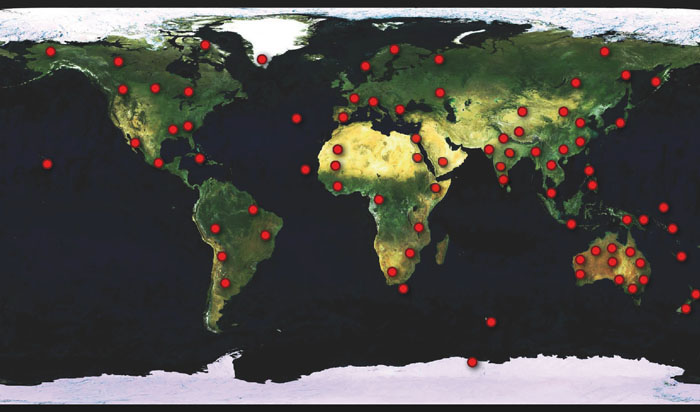The CCFS research program
The CCFS CoE builds on world-class infrastructure and will multiply the capabilities of the Collaborating and Partner Institutions. The research program aims to amplify existing strengths in geology, geochemistry, geophysics, experimental petrology and petrophysical/dynamic modelling, aiming at closer integration of these disparate fields.
MAJOR RESEARCH OBJECTIVES
- to determine, using constraints from Earth’s oldest crust and mantle, lunar samples and meteorites, the role of fluids in creating a dynamic planet
- to understand how Earth’s core-mantle system and its interaction with fluids has produced periodic cataclysms and controlled the evolution of the crust, hydrosphere and atmosphere
- to develop new approaches to petrophysical and dynamic modelling, integrating geophysics, geodynamics and geochemistry
- to develop an integrated Earth model linking tectonics, internal structure and dynamics, and the fluid-mediated transport of mass and energy from the interior to the surface
- to develop new approaches to interpreting geophysical imagery, for application to basic science and resource exploration
- to develop a new understanding of the timing and distribution of giant resource systems, based on a new level of understanding of Earth’s fluid plumbing systems, processes and dynamics
- to underatake the strategic, frontline developments in hardware, analytical methodologies, theory and software technology that are required to fulfil the research goals
These objectives are being addressed through the Research Projects described below and within the framework of the three Themes:
THEME 1: The Early Earth
THEME 2: Earth’s Evolution
THEME 3: Earth Today
The scope of the research, and thus of the inaugural projects, is determined by the funding base for 2011 with strategic leverage planned to expand available resources.
FOUNDATION RESEARCH PROJECTS
Foundation Projects have a substantial funding component from the ARC Centre funds allocation. The first tranche of these Foundation Projects was chosen from formal applications by CCFS participants based on presentations and discussions at a 2-day meeting in October 2010, ratified by the Executive Committee, and accepted on report to the Advisory Board. Additional requirements for the Foundation Projects include cross-node research participation, an interdisciplinary perspective and/or topics reflecting ARC grants relinquished consequent on the award of the CoE CCFS.
The range of topics covered by the Foundation Projects reflects studies within the three major proposed Themes prioritised within the imposed funding framework. Projects range across understanding Early Earth, identifying deep Earth fluids and element transport, tracking mantle evolution, geophysical imaging of deep-Earth flow, geodynamics of the Australian continent in the Proterozoic, and the 3-D architecture of the Yilgarn Craton (Australia) from new deep seismic and magnetotelluric datasets and crustal geochronology (see full list below).
Principles for Foundation Funding
Project applications were submitted using a short, but comprehensive, template providing information on researchers involved, aims/context/methods/innovation of the project, funding requested and justification, predicted outcomes and outputs with timetable and relevance to CCFS goals and Themes. Cross-node collaboration and participation of postgraduate students and early-career researchers were key factors in selecting the Foundation Projects.
Criteria for funding also included:
1) relevance to Centre goals
2) scientific merit and innovation
3) collaborative nature and cross-node participation
4) predicted outcomes and outputs within a timeframe
Foundation Projects also include three whole-of-Centre projects undertaking Technology Development, one of the key goals embedded in the Centre strategy.
FOUNDATION RESEARCH PROJECTS
| Project | Coordinator and main Centre personnel |
| 1. The TARDIS project: Tracking ancient residues distributed in the silicate Earth (Relinquished) | O’Reilly, Griffin, Pearson, Fiorentini, O’Neill, González-Jiménez (ECSTAR, ECR), Huang (ECR), Xiong and McGowan (PhDs) |
| 2a. Metal sources and transport mechanisms in the deep lithosphere |
Fiorentini, McCuaig, Barley, Rushmer, Griffin, Pearson, Evans, Reddy, Kilburn, Locmelis, Turner, O'Reilly, PhDs to be named |
|
2b. Dynamics of Earth’s mantle: assessing the relatives roles of deformation and magmatism |
Reddy and Kaczmarek (ECR) |
|
3. Generating and stabilising the earliest continental lithosphere - Late granite blooms |
Griffin, O’Reilly, O’Neill, Pearson, van Kranendonk, Belousova, Murphy (PhD) |
| 4. Two-phase flow within Earth’s mantle: modeling, imaging and application to flat subduction settings | O’Neill, Afonso, Yang, Li, Gorczyk, PhDs to be named |
|
5. Early evolution of the Earth system and the first life, from multiple sulfur isotopes |
Barley, Fiorentini, Kilburn, Wacey, Wilde, Nemchin, Griffin, PhDs to be named |
| 6. Detecting Earth’s rhythms: Australia’s Proterozoic record in a global context (Relinquished) | Li, Pisarevsky, Wang (ECR, ECSTAR), Wingate, Reddy, PhDs to be named |
|
7. Fluid regimes and the composition of the early Earth |
Wilde, Nemchin, Grange (ECR), Barley, Kusiak, Pidgeon, PhDs to be named |
|
8. Diamond Genesis: Fluids in deep-Earth processes (Relinquished) |
Griffin, O’Reilly, Pearson, Cliff, Kilburn, Howell (ECR), Ekaterina Rubanova (PhD) |
| 9. 4D lithospheric evolution and controls on mineral system distribution: The Western Superior-Yilgarn comparison |
McCuaig, Fiorentini, Kemp, Belousova, Cliff, Kirkland, van Kranendonk, McNaughton, PhDs to be named |
| 10a. 3D architecture of the western Yilgarn Craton | Gessner, van Kranendonk, Tyler, Belousova, Yang, Afonso, O’Neill, Gorczyk (Research Associate to be appointed) |
| 10b. Zircon Lu-Hf constraints on Precambrian crustal evolution in Western Australia | Wingate, Belousova, Tyler |
FOUNDATION CENTRE TECHNOLOGY DEVELOPMENT PROJECTS
| Cameca Ion microprobe development: maximising quality and efficiency of CCFS activities within UWA Ion Probe Facility | Kilburn, Cliff, Fiorentini, McCuaig, Barley, Pearson, Reddy |
| Frontiers in integrated laser-sampled trace-element and isotopic geoanalysis | Pearson, Cliff, Griffin, O’Reilly, Kilburn |
| Optimising mineral processing procedures: From rock to micro-grains | Pearson, Belousova, Daczko, Centre users |
For Foundation Project summaries, progress for 2011 and plans for 2012 see Appendix 1.
Where in the world is CCFS?


 ARC Centre of Excellence for Core to Crust Fluid Systems
ARC Centre of Excellence for Core to Crust Fluid Systems